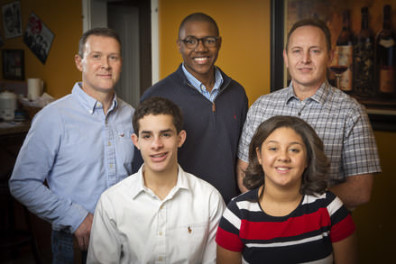The Fourteenth Amendment expanded the protection of civil rights to all Americans. In Obergefell v. Hodges, the Supreme Court held that the “Fourteenth Amendment requires a State to license a marriage between two people of the same sex and to recognize a marriage between two people of the same sex when their marriage was lawfully licensed and performed out-of-State.”
Before the Supreme Court decided Obergefell v. Hodges, the Robert H. Jackson Center hosted two of the petitioners whose case, Bourke v. Beshear, was one of the four Supreme Court cases joined and decided with Obergefell. The petitioners, Paul Campion and Randy Johnson, were interviewed at the Robert H. Jackson center by one of its board members and founders, Gregory Peterson. The interview included Paul Campion’s reflections on his childhood days here in Jamestown, New York, how he and Randy became a couple and the legal struggles they faced as a same-sex couple adopting children. And, ultimately, how their desire to keep the family intact inspired them to participate in this landmark Supreme Court case.

Paul Campion, born and raised in Jamestown, New York, met Randy Johnson, from just south of Louisville, Kentucky in 1991 and immediately felt a connection. Both came from conservative towns with religious families, Paul was Roman Catholic and Randy was Southern Baptist. Randy rejected his sexuality until the day he met Paul. Paul moved to Kentucky to live with Randy, and they knew that they wanted to have children.
When Randy and Paul decided to begin the adoption process in the fall of 1994, they could only find one adoption agency that would allow a gay man to adopt a child, Adoptions of Kentucky. To their benefit, the agency was more concerned with whether a person would be a good parent, rather than focusing on stereotypes and prejudices, which was exactly for what Paul and Randy were looking. However, only one of the men could be the legal guardian of the child; therefore, Paul became guardian of their first two children, Tevin and Tyler, born in February of 1995. Paul and Randy later wanted to include a daughter in their family and adopted Mackenzie who was born in 2003. Randy became the legal guardian of Mackenzie. In 2006, Paul met DeSean at the school where he was working and adopted him through the state rather than a private adoption agency.
Paul and Randy began to worry that if something were to happen to one of them, the other would not have legal rights to care for the child who was not his or her adopted parent. Although Paul and Randy legally married in California in July 2008, Kentucky and many other states at the time refused to recognize valid marriages from other states. This was one of the motivating factors that prompted them to join other same-sex couples the Bourke v. Beshear case against the state of Kentucky. Once Bourke reached the Supreme Court, it was consolidated with three other cases related cases pending before the Court from Michigan, Ohio, and Tennessee, which included Obergefell v. Hodges (the first of the four cases filed). The two main issues that the Supreme Court decided were:
Paul and Randy never expected to be part of the biggest Supreme Court case of the year when they joined with the plaintiffs in Kentucky to challenge the state’s rejection of their valid out of state marriage. Family is extremely important to the couple and they knew that they had to fight for same-sex couples’ familial benefits. Sensitive to their children’s wishes, Paul and Randy had many discussions with their four children about the case and whether or not they were comfortable with it. Randy said that the support they have received from everyone, but especially from their children, was the most enriching part of their journey. Paul and Randy’s 20 year old son, Tevin, has been documenting his journey and that of his two fathers on his tumblr page, “Making History with My Two Dads.”
The Robert H. Jackson Center’s “tagline” is:
This is an extremely important contemporary issue facing the Supreme Court involving individual liberties and the 14th Amendment, two issues about which Robert H. Jackson wrote eloquently. While it is impossible to speculate how Justice Jackson would have decided this case, he was on minds of both Justice Kennedy for the majority and Justice Scalia in his dissent. In fact, Justice Kennedy quoted directly from Justice Jackson’s opinion in West Virginia Board of Education v. Barnette, which challenged the Barnette sisters’ right to refuse to salute the flag because of their beliefs as Jehovah’s Witnesses. In 1943, the Court overturned its previous decision in Gobitis, and ruled that Jehovah’s Witnesses do have a right to refuse to salute the flag on religious grounds. Justice Jackson wrote for the majority and stated:
Jackson felt that, one’s civil liberties should not be left up to the majority’s decision in the unpredictable political process. The role of the political institutions, specifically, the judiciary, is to safeguard citizens from the tyranny of the majority.
On June 26, 2015, the United States Supreme Court held that “[t]he right to marry is a fundamental right inherent in the liberty of the person, and under the Due Process and Equal Protection Clauses of the Fourteenth Amendment couples of the same-sex may not be deprived of that right and that liberty.” Obergefell, et al., v. Hodges, et al., 576 U.S. __ (2015) (Kennedy, J.) (slip op., at 23).
Recognizing that individuals do not have to wait for the legislature to act before they assert a fundamental right, Justice Anthony Kennedy quoted the late Justice Robert H. Jackson to underscore that the essential “idea of the Constitution ‘was to withdraw certain subjects from the vicissitudes of political controversy, to place them beyond the reach of majorities and officials and to establish them as legal principles to be applied by the courts.’” Ibid. at 24 (citing West Virginia Bd. of Ed. v. Barnette, 319 U. S. 624, 638 (1943)).

